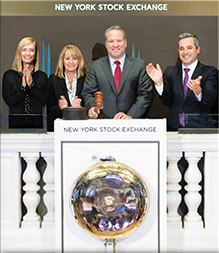(excerpt)
With this year’s market momentum largely being driven by growth sectors such as health care and technology, smart investors are looking for ways to diversify away some of the risks associated with those highflying areas should the market pull back.
Prices of agricultural commodities have been sliding thus far in 2015 due to a variety of factors, among them the strong dollar, weak demand in China, and most importantly, excess supplies due to major innovations in crop yields. However, history suggests that commodity prices do not go down forever, so playing a rebound in these prices seems like a good way to add a non-correlated asset to one’s portfolio. Positions with low or even negative statistical correlation, like commodities, can act as a hedge for a portfolio and help smooth out the recent volatility that we have seen in the stock market. …
…The challenge in grain commodities lies in exactly how to play this sector. Commodity traders understand the art of buying and selling futures contracts in one or more of the common agricultural products (corn, wheat, soybeans), but most investors have no experience trading futures. …
…The frustrating reality of commodity prices is that their direction is as difficult to predict as the weather. Literally, this is the case: Good weather and good growing seasons lead to excess supply, while poor weather and mediocre crop yields will boost prices. Many analysts still believe there will be a reduction in grain yield for 2015 mainly caused by the very wet early summer which limited the amount of acreage that could be planted (although the recent USDA report seems to throw this theory out the window). Although these poor growing conditions can be a struggle for local farmers, it can raise grain prices and allow commodity traders to make a quick buck. …
…Tyson has been in favor this year, returning 11.2% through July 31. Yet its valuation is quite reasonable at 11.6 times forward earnings (according to Morningstar). Longer term, it stands to benefit from secular growth in meat consumption in international and emerging markets, as consumers there become wealthier and shift their food preferences. For an investor seeking to benefit from a continued bear market in commodity grain prices, we would look to Tyson Foods as a clear beneficiary of the trend.
The U.S. is the largest grain exporter in the world by a significant margin, and increased grain prices would result in a boom to struggling farmers. Recent price stability and potentially lower than expected yield this harvest could be a bullish signal for grain prices, but there are still headwinds. A strong U.S. dollar makes the product grown here more expensive for importing countries which could then shift away from U.S. purchases, and in turn, lower prices even more. Demand could also be reduced by the recent slowdown in emerging market economies, such as China, adding more downward price pressure. If low grain prices are here to stay, look to those who benefit. We see meat and cereal producers thriving in this low input cost environment.
If you would like a copy of the complete article, please send an email request to This email address is being protected from spambots. You need JavaScript enabled to view it., or call toll-free 1-866-444-6246. If sending an email request, please include the following: title and date of article, and mailing address.







